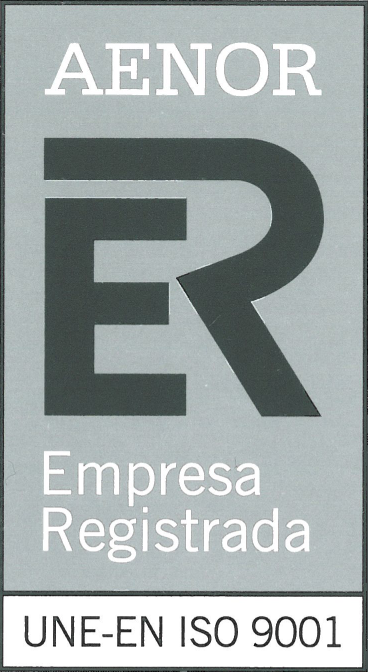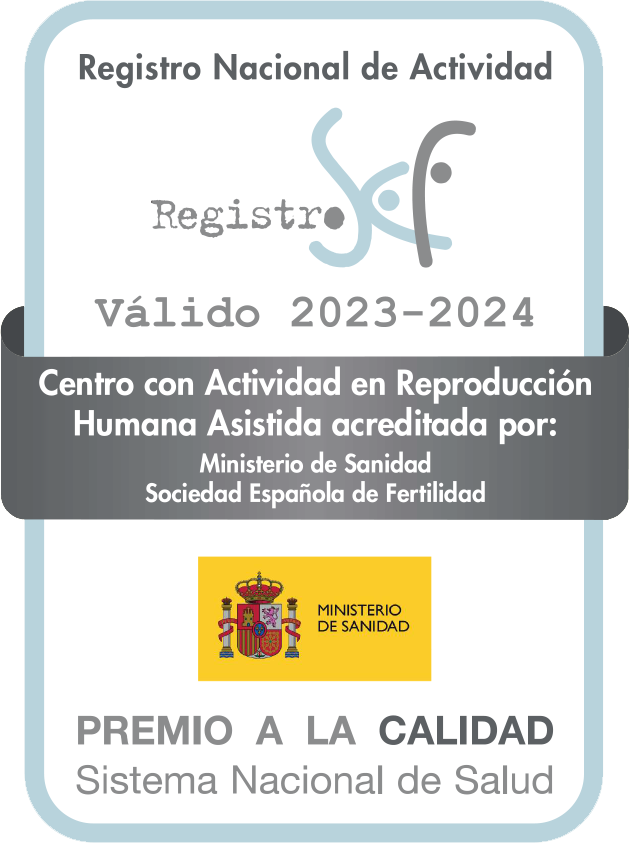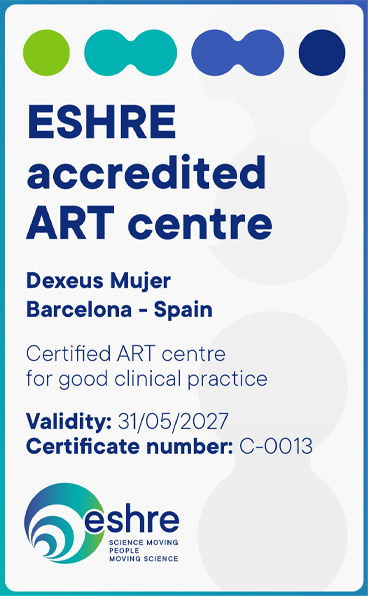PGT
What is Preimplantation Genetic Testing (PGT)
Preimplantation Genetic Testing (PGT) is a scientific method which allows to study the genetic characteristics of an embryo before it is transferred to the uterus, in order to prevent your future child from being born with a hereditary disorder.
This technique is useful in couples with high genetic risk and to improve the efficiency of an In Vitro Fertilization process.
At Dexeus Mujer, we are pioneers in preimplantation genetic diagnosis (PGD).
The first PGT pregnancy in Spain was achieved in 1994 in our hospital in collaboration with the Universitat Autònoma de Barcelona (UAB) to prevent the conception of a child with haemophilia in a couple where the mother was a carrier of the disease. Since then many couples have benefited from this technique.
In July 2006, our Obstetrics Department together with the Biomedical Division of the company Sistemas Genómicos achieved the first Multiple Hereditary Exostosis-free pregnancy in the world, using the Preimplantation Genetic Diagnosis technique.
Over the past 20 years, we have witnessed the birth of many babies without genetic disorders. Additionally, thanks to our methods and experience, the number of treatments with aneuploidy screening also enables couples with recurrent miscarriages or advanced maternal age to benefit from this technique, significantly increasing the likelihood of pregnancy.
More than 20% of assisted reproduction treatments performed in our clinic include PGD/PGTa, which follows an upward trend, as the average age of women opting for assisted reproduction technologies gradually increases, consequently increasing the risk of chromosomal abnormalities Dexeus Mujer has its own PGD laboratory, equipped with state-of-the-art technology and staffed by a highly qualified team of embryologists and geneticists skilled in the use of this high-precision technique.
The abortion rate is less than 15%.
What are the phases of the treatment
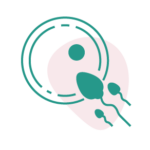
In vitro fertilisation
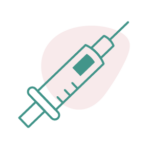
Embryo biopsy
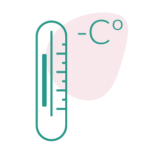
Cryopreservation of Embryos

Diagnostic Genetic Analysis

Embryo transfer
Who it is for
Preimplantation Genetic Testing is advisable if either you or your partner:
- Have a risk of transmitting a genetic disorder to your offspring.
- Have chromosomal abnormalities.
- Have had repeated miscarriages or repeated implantation failures.
- Have completed IVF cycles without success.
- Have a genetic predisposition for cancer.
- Have a child with a serious disorder requiring a transplant, and need to achieve pregnancy and to deliver a compatible donor.
- Monogenic diseases. Monogenic diseases are those caused by a specific gene mutation (cystic fibrosis, thalassemias, fragile X syndrome, etc.). To prevent the transmission of this disease by use of PGT it is essential to know the mutation causing the disease.
The number of the identified monogenic diseases is above 6,000, and many of which could cause severe health disorders. See the list of monogenic diseases analysed with PGT.
If, after a preconceptional genetic test, an increased risk has been detected for the offspring, it is possible to analyse the embryos to avoid future children being affected by the disease in question.
In cases of PGT of monogenic diseases, it is necessary to carry out a study of informativity prior to the PGT cycle to confirm that the diagnosis is feasible and adjust the technique to each case.
Chromosome abnormalities, numerical or structural
The presence of a chromosome reorganisation (Robertsonian translocations, reciprocal translocations and inversions) in one member of the couple may lead to difficulties in conceiving, miscarriages or congenital malformations. The use of PGT in these couples is extremely useful.
Both in the case of monogenic diseases and those associated with chromosomal reorganisation, it is necessary to conduct a genetic informativity study before the PGT cycle to confirm that the diagnosis is reliable and to adjust the technique to each individual case.
It is also indicated in cases of numerical chromosome abnormalities, pure or mosaic.
Couple coming from IVF programmes
The main cause of absence of pregnancy after a cycle of In Vitro Fertilization is the presence of chromosomal abnormalities in the transferred embryos. In the same way, the majority of first trimester miscarriages are caused by the implantation of an embryo with some chromosomal anomaly.
The Preimplantation Genetic Testing allows to complement an In Vitro Fertilization process, identifying embryos with alterations in the number of chromosomes and discarding them for the transfer. Only euploid embryos or with a normal chromosomal envelope are transferred. With this selection, it is possible to reduce the time to get a pregnancy and it reduces the chances of miscarriage and of conception affected by chromosomopathies.
There are certain factors that can predispose to an increased production of embryos with alterations in the number of chromosomes. In these cases, performing a PGT is especially beneficial:
- Advance maternal age (>37 years).
- Altered male meiosis.
- Couples with repeated miscarriage.
- Couples with repeated implantation failures.
- Other indications
Monogenic diseases
When a hereditary disease component is confirmed, the possibility of PGT would allow the possible appearance of this disease in the next generation to be avoided.
- Predisposition to certain diseases
- It is known that mutations of some gene predispose individuals to certain diseases that may appear at different life stages, such as neurofibromatosis, familial adenomatous polyposis or genetic breast cancer (BRCA1, BRCA2), etc.
In some of these cases, the express authorisation from the Health Authority is necessary in order to conduct PGT, following a favourable report of the National Commission of Human Assisted Reproduction which assesses the particular social, therapeutic and clinical characteristics.
PGT-HLA
The current law governing assisted reproduction techniques (Law 14/2006) considers the possibility of conducting a PGT cycle to determine the histocompatibility antigens for therapeutic purposes for third parties. This is used when a first-degree relative, generally a child, suffers from a serious hematopoietic disease that requires the transplant of histocompatible bone marrow or umbilical cord cells.
In order to conduct PGT-HLA, express authorisation from the corresponding Health Authority with a prior favourable ruling from National Commission of Human Assisted Reproduction which evaluates the social, therapeutic and clinical characteristics of each case.
The first child born after the application of PGT-HLA was in the USA in 2000. This permitted the successful donation of umbilical cord cells to his sister who had Fanconi anaemia.
List of monogenic diseases
The number of the identified monogenic diseases is above 6,000, and many of which could cause severe health disorders.
List of monogenic diseases analysed with PGT:
- Adrenoleukodystrophy
- Fanconi anaemia
- Friedreich’s ataxia
- Spinocerebellar ataxia 1, 2 and 3
- Spinal and bulbar muscular atrophy
- Facioscapulohumeral dystrophy
- Myotonic dystrophy
- Duchenne and Becker muscular dystrophy
- Charcot-Marie-Tooth
- Gaucher’s disease
- Huntington’s disease
- Tuberous sclerosis
- Cystic fibrosis
- Gangliosidosis
- Hemophilia A and B
- Incontinentia pigmenti
- Myotubular myopathy
- Multiple endocrine neoplasia (MEN2)
- Neurofibromatosis type I and II
- Osteogenesis imperfecta (brittle bone disease)
- Familial adenomatous polyposis
- Polycystic kidney (autosomal dominant and recessive)
- Retinosis pigmentaria
- Alport syndrome
- Mucopolysaccharidosis type II (Hunter syndrome)
- Hurler syndrome
- Lesch–Nyhan syndrome
- Marfan syndrome
- Von Hippel-Lindau syndrome
- Wiskott–Aldrich syndrome
- Fragile X
- Thalassemia
Performing a PGT cycle for these diseases does not require the express authorization of the health authorities.
Success rates
Why choose us

We are pioneers in reproductive medicine
We have more than 80 years’ experience behind us and a team of highly qualified and specialised professionals. The first Spanish test-tube baby was born in our clinic (1984) and Spain’s first egg donation treatment was carried out here, which culminated in the birth of twins (1988). In 1994, in partnership with the Autonomous University of Barcelona, we achieved the first successful post-PGT pregnancy in Spain, which culminated in the birth of two healthy baby girls from a mother with haemophilia.

Extensive experience, quality and cutting-edge technology
We have one of the top in vitro fertilisation laboratories in Europe where we perform over 3,000 cycles (assisted reproduction techniques) each year. We offer the latest advances in assisted reproduction, such as intracytoplasmic sperm injection and real-time monitoring of embryo development (dynamic monitoring).

We have our own PGT laboratory
Which is equipped with state-of-the-art technology, and a highly qualified team of experts in this high-precision method.

High success rate
25% of our patients have a history of treatment failure in other clinics. However, our success rate is around 45-55% at the first attempt, with an overall cumulative rate of around 80%.

Personal attention
We will guide you through the entire process, offering personalised treatments suited to your needs. You can also contact our medical team directly at any time.
Testimony
Silvia, 37 years old. Barcelona
I am a carrier of a hereditary disease, as are my brother and my father. When my husband and I considered having children, I was very clear that I did not want them to also suffer from the family disease and have the problems that we have. For this reason, we visited Dexeus Mujer and there they explained to us that we could select healthy embryos. After undergoing IVF treatment we obtained 5 embryos, two of them healthy. Our first daughter has just been born and we couldn’t be happier!
More information and prices
Or, if you prefer, fill in this form and we’ll call you
What is the best treatment for me?
If you don’t know which treatment is best suited to you, try our online pre-diagnosis.



